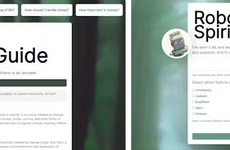
IACAD Launches 'Virtual Ifta' in Dubai to Issue Fatwas & Islamic Rulings
Even religion, with its strong ties to tradition, cannot escape technological innovation and the latest example comes with a reimagination of the fatwa service in Dubai. Recently, the Islamic Affairs & Charitable Activities Department (IACAD) launched an AI-powered platform that is considered to be a world-first. Dubbed 'Virtual Ifta,' the platform is the first digital fatwa service, with the capacity to "answer over 200 questions on Muslim prayer." Individuals who wish to access this platform can do so live through internet chat.
The digital fatwa service was showcased at The Boulevard, Emirates Towers during a three-day exhibition. Virtual Ifta was set up for attendees to experience, while the event also narrated the evolution of issuing fatwas — "from face-to-face meetings to writings, phone, video conferencing, email, website, and now AI."
Image Credit: YouTube
The digital fatwa service was showcased at The Boulevard, Emirates Towers during a three-day exhibition. Virtual Ifta was set up for attendees to experience, while the event also narrated the evolution of issuing fatwas — "from face-to-face meetings to writings, phone, video conferencing, email, website, and now AI."
Image Credit: YouTube
Trend Themes
1. AI-powered Fatwa Services - The development of an AI-powered platform for issuing fatwas presents an opportunity for the integration of technology in religious services.
2. Digitalization of Religious Practices - The launch of the 'Virtual Ifta' platform in Dubai indicates a growing trend in using technology to modernize and digitize traditional religious practices.
3. Enhanced Accessibility of Religious Guidance - By offering an internet chat-based platform for accessing fatwas, the Virtual Ifta service aims to make religious guidance more easily accessible and interactive for individuals.
Industry Implications
1. Religious Services - The AI-enabled fatwa service has the potential to disrupt and transform the traditional approach to delivering religious services by integrating advanced technology.
2. Technology - The development of AI-powered platforms like Virtual Ifta opens up new opportunities for innovation in the technology industry, specifically in the domain of religious applications.
3. Chatbot and Virtual Assistant Solutions - The introduction of the Virtual Ifta platform highlights the potential for advancements in chatbot and virtual assistant solutions, particularly in providing personalized guidance based on religious principles.
0.9
Score
Popularity
Activity
Freshness
















